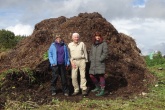PAS 100 compost quality standard to undergo revisions
The PAS 100 recycled compost quality standard is to be updated with new criteria after certification and consumer protection organisation Renewable Energy Assurance Limited (REAL) initiated a formal BSI revision process, ensuring the standard is up to date with the latest developments in the organics industry.
The revision will be guided by public consultation with stakeholders in industry, academia, and not-for-profit sectors who will be asked to discuss proposed draft changes at stakeholder meetings and workshops.
Jenny Grant, Scotland manager for the Organics Recycling Group (ORG), part of the Renewable Energy Association (REA), has been selected as technical author and will draft revised changes agreed upon once consensus is reached among stakeholder groups.
Introduced in 2005, PAS 100 (Publically Available Specification for Composted Materials) is a recognised standard for composting quality and is required in order for compost to be classed as a product and not waste and can therefore be used in agriculture or horticulture. Over 170 producers are PAS 100 certified, contributing 1.8 million tonnes of compost a year.
The PAS 100 standard is promoted and implemented by the Compost Certification Scheme (CCS), which was relaunched in 2014 after it was taken over by REAL following the 2012 merger of AfOR and the REA.
‘Leading the sector into a new era of sustainable growth’
The latest revision is the second time that the standard has been revised and updated, with the last revision coming in 2011, while guidelines on improving feedstock quality through reducing contaminants were published back in 2014.
Commenting on the announcement, Gregor Keenan, CCS Producers’ Forum Representative, said: “PAS100 certification forms the basis for end of waste criteria but it has also become a ‘brand’ symbolising a fully recycled, consistent, quality product.
 “Since its inception PAS100 has been updated reflecting changing industry practice, new feedstocks and stakeholder requirements – the current revision is part of this continuing process. The revision should ensure that PAS100 remains relevant, appropriate and continues to meet stakeholder requirements.
“Since its inception PAS100 has been updated reflecting changing industry practice, new feedstocks and stakeholder requirements – the current revision is part of this continuing process. The revision should ensure that PAS100 remains relevant, appropriate and continues to meet stakeholder requirements.
“Speaking as a producer, I am pleased with the appointment of Jenny Grant as Technical Author. Jenny has been active in the organics industry for many years and has a wealth of experience working with producers, regulators and end markets. As always, I would encourage producers to actively participate in the revision process to ensure their views are put forward.”
Virginia Graham, Chief Executive of REAL, added: “I am delighted to be working with British Standards Institute, the environmental regulators and other important stakeholders to ensure that the process of revising PAS 100 runs smoothly and results in a revised standard that is up-to-date and responds to the changing policy and market context.”
For an overview of the revision process and meetings, visit the CCS website.








